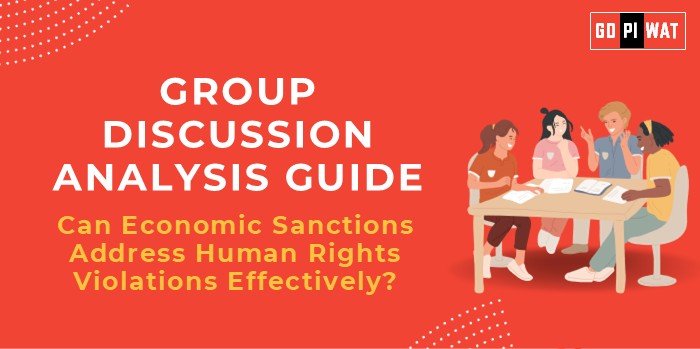📋 Group Discussion Analysis Guide
🌍 Can Economic Sanctions Address Human Rights Violations Effectively?
💡 Introduction to the Topic
🌱 Opening Context: Economic sanctions are a common tool in international diplomacy, often deployed to pressurize governments into upholding human rights. Their effectiveness, however, remains a subject of global debate.
📜 Topic Background: Sanctions have been historically employed against nations accused of severe human rights violations, such as South Africa during apartheid and Myanmar under military rule. The aim is to isolate and coerce offending regimes while signaling international disapproval.
📊 Quick Facts and Key Statistics
- 🌐 Sanctioned Nations: Over 30 countries face international sanctions for various reasons, including human rights violations (UN, 2023).
- 📉 Economic Impact: Iran’s GDP shrank by 6% in 2020 due to sanctions, affecting public welfare.
- 🍞 Humanitarian Exceptions: UN sanctions include exceptions for food and medicine, mitigating civilian suffering.
- 📈 Effectiveness Rate: Studies indicate a success rate of 34% in achieving policy goals, including human rights improvements (Carnegie Endowment, 2023).
🌍 Stakeholders and Their Roles
- 🏛️ Sanctioning Bodies: UN, EU, and the US initiate and enforce sanctions globally.
- ⛔ Affected Governments: Often argue sanctions violate sovereignty and harm citizens.
- 👥 Citizens: Bear the economic brunt, leading to potential humanitarian crises.
- 🌐 NGOs and Advocacy Groups: Monitor human rights impacts and push for targeted sanctions.
- 🏢 Global Businesses: Face disruptions and compliance costs, influencing lobbying dynamics.
🏆 Achievements and Challenges
🌟 Achievements:
- ✔️ Ending Apartheid: Sanctions on South Africa in the 1980s played a crucial role.
- 📢 Isolating Offenders: Sanctions on Myanmar increased global awareness of its military’s abuses.
- ⚖️ Promoting Compliance: Libya abandoned its WMD program partly due to sanctions.
⚠️ Challenges:
- 🚨 Humanitarian Impact: Sanctions on Iraq in the 1990s contributed to widespread suffering.
- 🔄 Circumvention: North Korea uses illegal trade networks to evade sanctions.
- ⚡ Diplomatic Strains: Sanctions risk alienating allies or sparking retaliatory measures.
🌍 Global Comparisons:
- ✅ Successful: Sanctions on South Africa.
- 🔄 Mixed Results: Iran sanctions weakened its economy but didn’t halt nuclear advancements.
📜 Case Studies:
- 🇻🇪 Venezuela: Economic sanctions exacerbated its humanitarian crisis without major policy changes.
✨ Structured Arguments for Discussion
- 💬 Supporting Stance: “Economic sanctions can be effective in pressuring regimes to respect human rights, as seen in South Africa’s apartheid-era sanctions.”
- ⚖️ Opposing Stance: “Sanctions often harm ordinary citizens more than leaders, undermining their moral legitimacy.”
- 🔄 Balanced Perspective: “While sanctions can pressure violators, their success depends on targeting and enforcement mechanisms.”
🎯 Effective Discussion Approaches
📖 Opening Approaches:
- ✔️ Start with the global success of sanctions in ending apartheid.
- 📉 Highlight humanitarian challenges using Venezuela as an example.
🔄 Counter-Argument Handling:
- ⚙️ Example: “While sanctions on Iraq led to suffering, targeted sanctions with humanitarian exemptions can minimize such effects.”
📈 Strategic Analysis of Strengths and Weaknesses
- 💪 Strengths: Global signaling of human rights priorities; non-military coercion.
- ⚠️ Weaknesses: Collateral damage to civilians; risk of sanctions fatigue or evasion.
- 💡 Opportunities: Improved targeting using AI and global networks; strengthened global coalitions for enforcement.
- 🚨 Threats: Diplomatic fallout; prolonged suffering without desired policy changes.
📚 Connecting with B-School Applications
- 🌟 Real-World Applications: Discussions on economic policies in global trade; case studies on public policy decision-making.
- 💬 Sample Interview Questions:
- “What alternative strategies to sanctions could address human rights abuses?”
- “How can businesses navigate sanctions compliance?”
- 📖 Insights for B-School Students:
- Explore financial impacts of sanctions on trade.
- Study ethical dilemmas in business and governance under sanctions.


